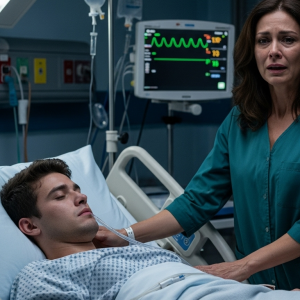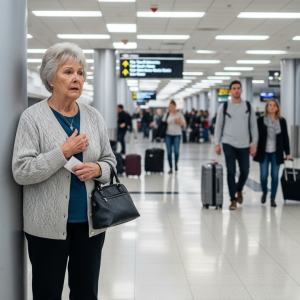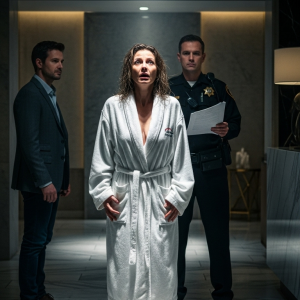My name is Mia Anderson. I am twenty-three now, but my story truly begins on the night I turned eight—the night I learned that not all parents love their children. The night I was discarded.
I grew up in a house in Seattle that felt more like a museum than a home. Everything was polished, expensive, and immaculate. I was the only flawed exhibit. My parents, Jonathan and Katherine Anderson, were renowned attorneys, paragons of discipline and success. In their world, there was no room for error.
My younger brother, Adam, was their masterpiece. He was brilliant, charming, and effortlessly met their sky-high expectations. His achievements were celebrated with praise and affection. He was their golden child. I was the afterthought, the problem they didn’t know how to solve.
No matter how hard I tried, I was never enough. An ‘A’ for Adam was a cause for a party; a ‘B’ for me was a source of personal shame for them. “Figure it out yourself,” was their response to my struggles with homework. For Adam, they hired the finest tutors. I spent my childhood chasing an approval that was always just out of reach, convinced that one day, they would finally see me.
That day never came. The end arrived on a cold evening when I was eight. I had just returned from school, the weight of my backpack matched only by the stone in my stomach. In my hand, I clutched a math test. I had studied for weeks, pouring over every problem, desperate to finally make them proud.
The result was a C+.
As I stepped inside, their voices drifted from the living room—sharp, cold, and laced with disappointment. My small hands crumpled the test paper as I stood frozen, listening.
“She is a reflection of failure,” my mother’s voice cut through the air. “We provide her with every advantage, and this is the return on our investment.”
My father’s tone was even colder. “We have exhausted our efforts trying to mold her. Perhaps some materials are simply not meant to hold a worthwhile shape.” My breath hitched. They were discussing me as if I were a flawed piece of pottery.
“She lacks drive,” he continued. “She is not the kind of daughter we can present with pride.” Tears blurred my vision. I had tried, harder than anything, but it was never going to be enough.
Then, my mother’s next words made my blood run cold. “We cannot continue this project. It’s time we cut our losses.” The floor seemed to vanish from beneath my feet. I was eight years old. Surely, she couldn’t mean it.
But she did.
After a silent dinner, they summoned me. My father sat on the couch, arms crossed, his face a mask of detached judgment. My mother stood beside him, her expression unreadable. Adam was, as always, conveniently absent from these moments.
“Mia, we have made a decision,” my father began, his voice devoid of emotion. “You consistently fail to meet our standards. Frankly, we are tired of the effort.”
A shiver traced its way down my spine. “Trying to do what?” My voice was a whisper.
My mother answered without a flicker of hesitation. “Trying to fix you. If you cannot live up to the name you carry, then perhaps you should not live here.”
The air rushed from my lungs. My hands began to tremble. “Where… where would I go?”
My father sighed, a sound of pure annoyance. “That is a problem for you to solve.”
Something inside me fractured. Panic seized my chest, and I stumbled forward. “Please,” I begged, tears streaming down my cheeks. “I’ll do better. I promise. Just don’t make me leave.” I reached for my mother’s hand, desperate for any sign of warmth.
Instead, her hand moved with startling speed. The sound cracked through the silent room, a sharp, stinging report as her palm connected with my cheek. My head snapped to the side, and I staggered back, the world dissolving into a ringing silence.
My heart hammered against my ribs. A hot fire bloomed on my skin, the pain sinking deep into my bones. I brought a trembling hand to my face, touching the swelling skin. Through a film of tears, I looked at her, my expression a mess of shock and betrayal. She didn’t even flinch.
“Get out,” she commanded, her voice low and absolute.
I looked to my father, pleading with my eyes for him to intervene, to say something. He simply turned a page in his newspaper, utterly indifferent. That was it. In that moment, I ceased to be their daughter. I finally understood they had never wanted me at all.
Tears blinded me, but I refused to let them see me cry. Begging hadn’t worked. Crying wouldn’t change their minds. Without another word, I turned and fled to my room.
My hands shook as I pulled a small bag from my closet, stuffing it with whatever clothes I could grab. I had no idea where I was going or what I would do. I only knew I had to leave. Zipping the bag, I took one last look around the sterile room. It had never felt like a home, and now I knew why.
My mother stood in the hallway as I walked toward the front door, her arms crossed in a posture of finality. My father remained in his chair, lost in his paper. With a deep breath, I swallowed the lump in my throat and looked at them one last time, a silent, final plea.
They offered nothing. My mother pulled the door open, the rush of cold night air hitting me like another blow. “Leave.”
I stepped out, clutching my bag. The door clicked shut behind me, the sound echoing with a terrible finality. I was alone.
The streets of Seattle were a labyrinth of flickering lights and deep shadows. The distant hum of traffic and the occasional bark of a dog only amplified my profound solitude. I walked for what felt like hours, my body aching and a gnawing hunger twisting my stomach.
Just as I felt I could not take another step, a familiar voice cut through the darkness.
“Mia?”
I froze, my breath catching in my throat. I turned to see a woman standing under a streetlight, her face etched with worry. It was my aunt, Mary. For a moment, I thought my exhausted mind was playing tricks on me.
But then she was rushing toward me, her eyes taking in my tear-stained face, the bag clutched in my hand, and the angry red mark on my cheek. “Oh, my sweet girl. What on earth are you doing out here?”
I tried to speak, but the words wouldn’t come. How could I explain that my own mother had struck me? That my parents had thrown me away like trash?
Mary saw the agony in my eyes. She didn’t need an explanation. She simply pulled me into a fierce, warm hug. It was the first real embrace I had felt in years, and it was my undoing. The dam I had built against my tears shattered, and I sobbed into her shoulder, all the pain and fear pouring out of me.
She just held me, letting me fall apart. When I finally pulled back, she gently touched my face, her thumb brushing against my swollen cheek. Her eyes hardened with a cold fury. “Who did this to you?”
I hesitated, then whispered the truth. “My mom. She… she told me to leave.”
Mary’s jaw tightened, and for a second, she looked as if she was about to march to their house and burn it to the ground. Instead, she took a deep, calming breath. “Come with me,” she said, her voice soft but firm. “You’re safe now, Mia. I promise.”
For the first time that night, as she took my hand, I believed it
Mary’s apartment was a world away from the cold, sterile house I had left behind. It was small but filled with warmth—soft blankets, family photos, and the scent of vanilla. It felt more like a home in five minutes than my parents’ house had in eight years.
She sat me at her kitchen table and, without a barrage of questions, made me a bowl of soup. As I ate, the warmth spread through me, chasing away some of the deep, gnawing chill.
When I was done, she sat across from me. “Now,” she said gently. “Tell me everything.”
And so I did. I told her how they never wanted me, how Adam was the favorite, and how a C+ on a math test was the final straw. My fingers ghosted over my cheek as I recounted the final moments.
When I finished, a heavy silence filled the room. Mary’s face was a mask of fury. “I always knew your parents were cold,” she said, her voice trembling with rage. “But this… this is monstrous.”
Tears welled in my eyes again, but this time, they were mixed with anger. How could they do this? How could they sleep at night?
Mary reached across the table and squeezed my hand. “Listen to me, Mia. You are not a failure. You are not worthless. You are brilliant and strong, and you deserved none of this.”
Her words were a balm on a wound I didn’t even know was so deep. For my entire life, I had been trying to earn my place. Sitting in Mary’s kitchen, I realized I shouldn’t have had to. They had made their choice. Now, I would make mine.
That night, I slept peacefully for the first time in as long as I could remember. There were no arguments muffled by my bedroom door, no crushing weight of inadequacy. I was safe.
The next morning, Mary made me breakfast. “You can stay here as long as you need,” she said, as if it were the most obvious thing in the world. I mumbled something about not wanting to be a burden.
She scoffed. “You are not a burden, Mia. You never were.”
With Mary’s unwavering support, I began to piece my life back together. She helped me enroll in a new school, far from the shadows of my past. It was hard at first; I was conditioned to flinch at loud voices and to constantly seek approval. But Mary was patient.
“You’re smart, Mia,” she would tell me every day. “You can do anything.”
Slowly, I began to believe her. I studied, not for praise, but for myself. My grades soared, and with them, my confidence. I was finally discovering who I was without my parents’ judgment clouding my vision.
Years passed. I rarely thought of my parents, but I did worry about Adam. I had escaped the museum, but he was still one of its prized exhibits, trapped behind the velvet ropes of their expectations.
One evening, my phone buzzed with a text from a number I recognized instantly: Adam.
Can we talk?
My fingers hovered over the screen. A part of me wanted to ignore it, to keep that door to the past firmly closed. But another part, the part that remembered a little brother beneath the title of “golden child,” knew I had to respond.
Yes. What’s wrong?
His reply was immediate. Can we meet? I just… I need to get out of this house.
The desperation in his words was palpable. This wasn’t the confident, perfect Adam I remembered. An hour later, we were sitting in a quiet coffee shop. He looked exhausted. His eyes were shadowed, and he tapped a nervous rhythm on the table.
“Hey,” I said, keeping my voice neutral.
He looked up, his expression a mixture of shame and despair. After a long, heavy silence, he finally spoke. “Mom and Dad… they’re suffocating me, Mia. Every choice, every decision, is theirs.”
He explained that he wanted to apply to a performing arts school to study music. They had called it a waste of his potential.
I frowned. “I thought you wanted to be a lawyer, like them.”
He let out a hollow laugh. “That was their dream, not mine. I’ve been playing a part my whole life.” For the first time, I saw him not as my rival, but as a fellow prisoner. His cage was gilded, but it was a cage nonetheless.
“I can’t do it anymore,” he whispered, his voice cracking. “I don’t want to spend my life chasing a version of perfection that isn’t even mine.”
I knew that feeling all too well. I took a deep breath. “You don’t owe them your life, Adam,” I said firmly. “If this isn’t what you want, you have a choice. You can leave.”
He looked terrified. “It’s not that simple. They control everything—my tuition, my bank account… I have nothing without them.”
I met his gaze, a sudden clarity washing over me. “Then come stay with me and Mary,” I said, the offer leaving my lips before I had time to second-guess it. “If you’re serious about getting out, we’ll help you. You don’t have to be alone.”
For a long moment, he just stared at me. Then, with a slow, deliberate motion, he nodded. “Okay.”
And just like that, the foundation of our old life crumbled for good. He wasn’t the lucky one. He was just the last one to break free.
The night Adam left was thick with a tension I could feel from the car, parked down the street from our childhood home. He had packed a single bag, just as I had. But this time, it was an act of rebellion, not rejection.
Mary and I waited, my stomach twisting into knots. We saw the front door open. Adam walked out, followed by our parents. Even from a distance, I could see the fury on their faces.
“Are you sure he’s ready for this?” Mary murmured.
“He has to be,” I whispered back.
My father’s voice carried on the still night air, sharp and commanding. “If you walk out that door, don’t ever think about coming back.”
Adam paused at the bottom of the steps. I held my breath, feeling the immense weight of his decision. Then, he turned back to them. “Then I won’t.”
My mother laughed, a bitter, ugly sound. “You’re a fool, Adam. You’ll be nothing without us.”
They were the same words they had used to break me. But Adam didn’t break. He looked at them one last time, his voice clear and steady. “No, Mother. I was nothing with you.”
He turned and walked toward our car without looking back. As soon as he was inside, Mary sped away. I looked at my brother, expecting to see regret or sadness. Instead, I saw an overwhelming wave of relief wash over his face. He was free.
The following months were a period of rediscovery. Adam, free from our parents’ crushing oversight, began to flourish. He played his guitar, wrote songs, and for the first time, talked excitedly about his future—a future he was choosing for himself.
One evening, Mary came to us with an idea. “What if we took everything you two have been through,” she began, her eyes shining, “and turned it into something good?”
She proposed a community center—a safe place for kids who felt lost, pressured, or abandoned. A place where they could pursue their passions without judgment. A place where they could simply be themselves.
The idea ignited a fire in both of us. We would build the sanctuary we never had. Months of hard work followed, but we poured our pain and healing into every wall, every decision. We called it the Anderson Community Center—reclaiming our name on our own terms.
Just as I thought the past was finally behind me, it called. Literally. An unknown number flashed on my phone. My stomach clenched. It was her.
“Mia,” my mother’s voice was crisp, as if no time had passed. “We need to talk.”
I held the phone, my knuckles white. “There’s nothing to talk about.”
She sighed, a sound of manufactured patience. “This little rebellion has gone on long enough. It’s time for you and Adam to come home.”
I almost laughed. Home? “That place stopped being my home the day you cast me out,” I said, my voice eerily calm.
“Don’t be dramatic,” she snapped. “You need stability, a real career. That little charity project of yours is not a future.”
I took a deep breath, feeling a profound sense of peace settle over me. The scared little girl who once begged for her love was gone. “Let me be perfectly clear,” I said, my voice resolute. “You are not my family. You lost that right years ago. I used to dream of you apologizing, but now I see you’re incapable of change. And the truth is, I don’t need you to.”
Her silence was sharp. “You will regret this, Mia.”
A small smile touched my lips. “No,” I replied softly. “The only thing I regret is spending so long wanting the approval of people who were never capable of giving it.”
With that, I ended the call and blocked her number for good.
On the day of the community center’s grand opening, I stood between Mary and Adam, watching as children filled the space with laughter and music. This was my family. This was my home. I no longer needed their approval. I had found something far better: myself.




